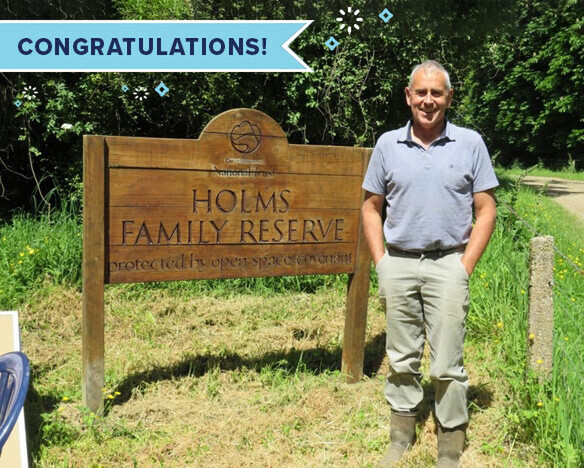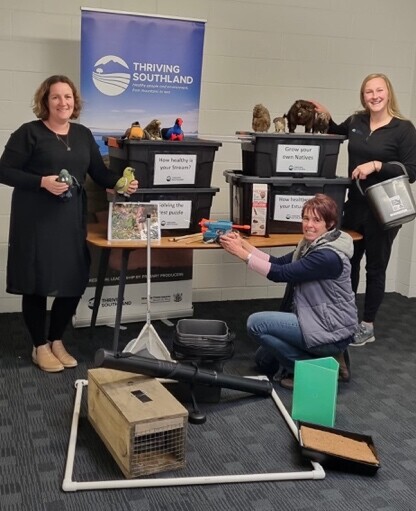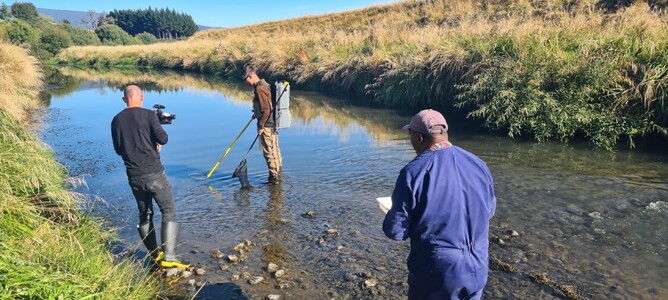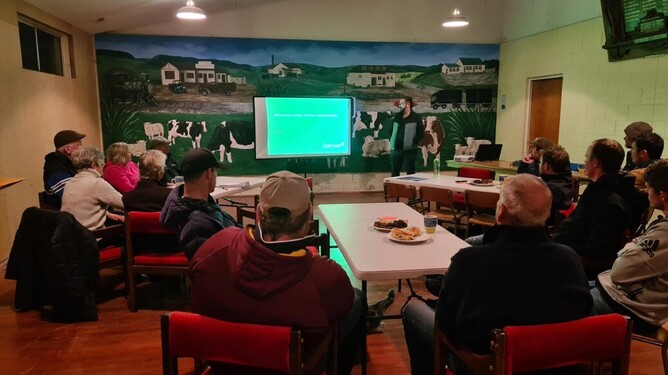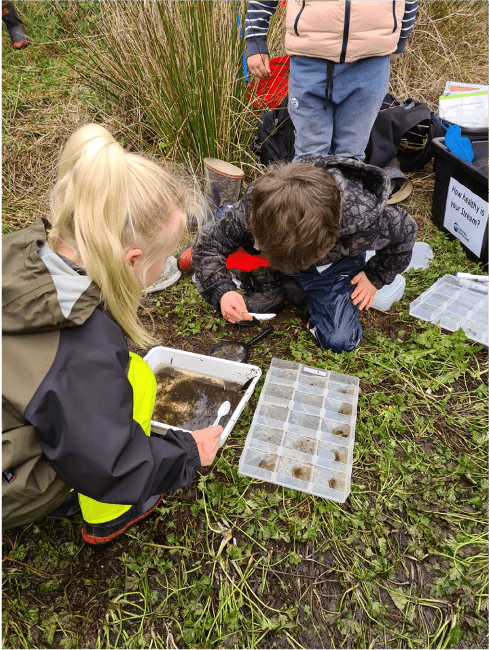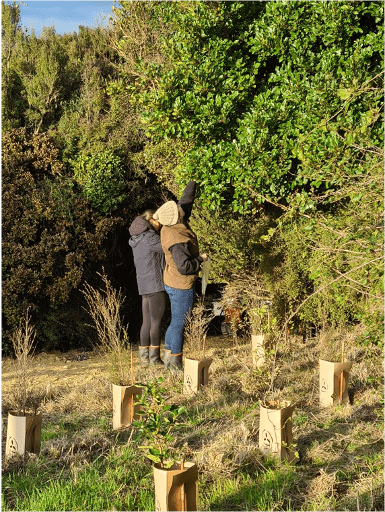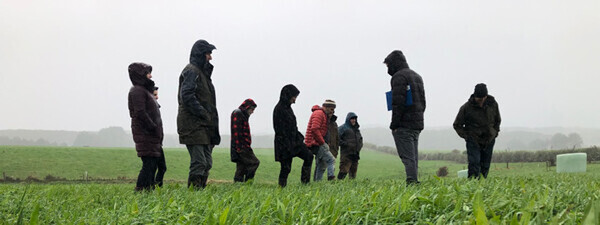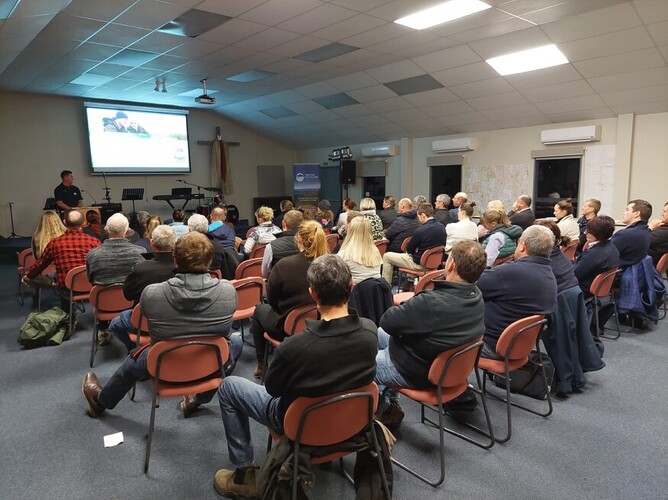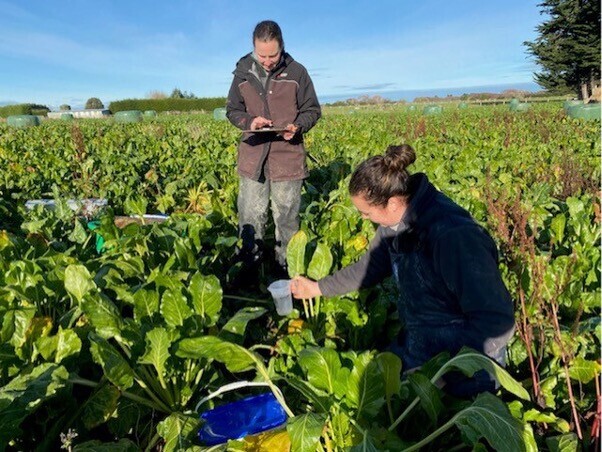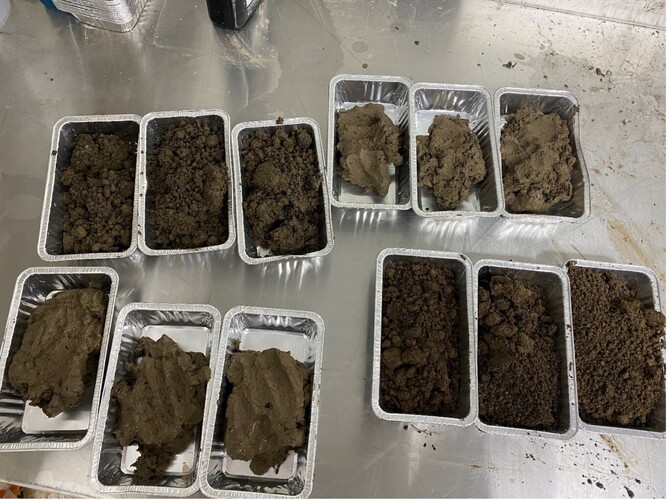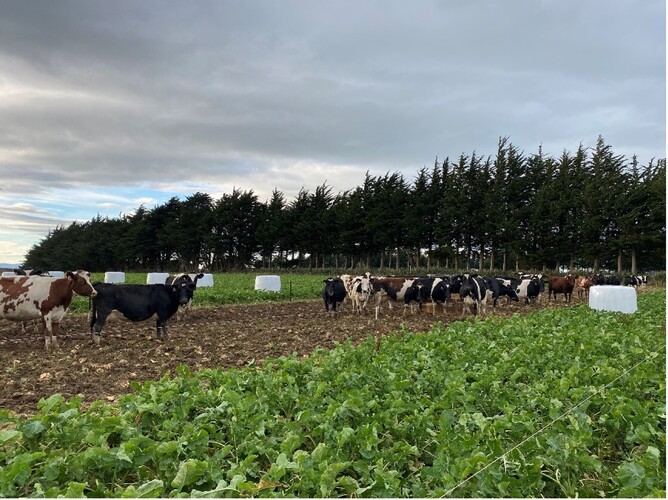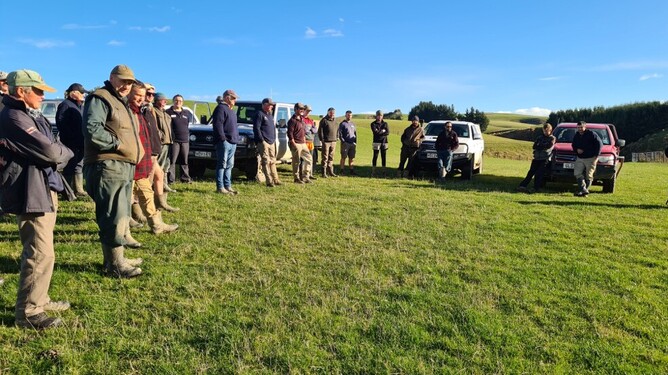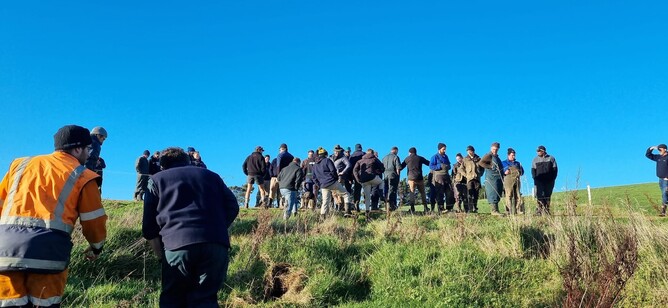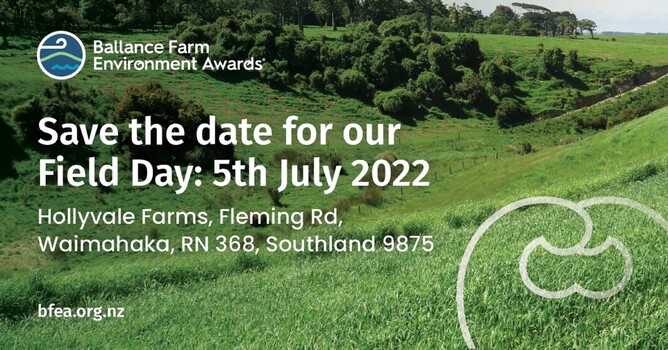Welcome to our July newsletter!
We’re headlong into our winter season now, but after the COVID-19 disruptions earlier in the year there’s a real sense of wanting to get out there and do things in the many Catchment Groups around our region.
The diversity of activity happening among Catchment Groups is fantastic and it’s always exciting to see people from other Groups attending events in other catchments. The sharing of ideas between everyone involved is great to see. Funding forums, winter grazing projects and demonstrations, kids using our new education kits in the field, and newer Groups getting stuck into water quality testing - it’s all great stuff.
During the month we held another stakeholder meeting to share all the work Catchment Groups are doing, and update on the projects underway. It was a fantastic networking, learning, sharing opportunity, and helps further strengthen the connections.
We really appreciated the feedback on how Thriving Southland is helping empower farmers with science and knowledge shared through the Catchments Group network. Its also great to hear the recognition of the Southland Catchment groups are getting both locally and nationally for all work they are doing.
There’s a few mid-winter get-togethers happening around various Catchment Groups and plenty of other events happening this coming month, from fresh water crayfish project talks, to Regional Forum catch-ups, to field days and planning meetings.
Keep warm everyone.
Aparima Catchment Group science brochures now available
Catchment Groups have been asking for more detailed insights into their individual catchments to help their farmers to make informed decisions on their farms.
There is plenty of available information but it has never been collated into one place – until now!
We’ve pulled a whole range of information together into brochures; providing insights based on available information, bringing together published science, research, data and information on the state of water, soil and land in catchments.
They provide details on what affects water quality and how these impact the rest of the catchment, including out-of-catchment areas that may be impacted by what goes on in the catchment, such as the estuary.
All Southland catchments will get a brochure – but the first FMU completed is Aparima – with a brochure per catchment.
You can have a read of the six Aparima brochures at https://www.thrivingsouthland.co.nz/aparima/
Nominations are now open for the 2022 Environment Southland Community Awards
You can nominate yourself or someone else/a group/business/farm/school that you're involved with or know about whose activities are benefiting the environment. Categories include:
- Environmental Leadership in Farming
- Environmental Action in Biodiversity and Biosecurity
- Environmental Action in Education
- Environmental Action in Water Quality Improvement
- Individual Environmental Action or Leadership
- Environmental Leadership and Innovation in Business
All nominees will be invited to attend the awards dinner to be held on Thursday, 10 November at the Ascot Park Hotel, Invercargill, where the winners will be announced.
More information can be found here
July Events Calendar
You’ve been telling us that there is no single place to find out all the various events happening throughout Southland. We’ve done our best to collate all the Southland agri-events into one handy calendar. You can print it and pop on your fridge.
The July calendar will be available on our website events page in the next couple of days.
Catchment Groups among New Zealand Farm Environment Trust awards winners
Kevin Hall
Congratulations to all New Zealand Farm Environment Trust awards winners around Southland. The awards were handed out at a ceremony in June, which was an inspirational celebration of farms, farmers, Catchment Groups and communities in Southland. Many of the winners are part of Southland’s Catchment Groups.
Congratulations to the Pourakino Catchment Conservation Trust for receiving the first ever Catchment Group Award. Very well deserved and we look forward to seeing what you guys get up to next. And cheers to the Mid Oreti Catchment Group for all their great efforts, we LOVE the work you guys are doing.
Congratulations to Kevin Hall from Hollyvale Farms at Waimahaka, the Three Rivers Catchment Group Chair, and now the BFEA 2022 Supreme Regional Winner.
OTHER SOUTHLAND BALLANCE FARM ENVIRONMENT AWARD WINNERS 2022:
- Beef + Lamb New Zealand livestock farm award: Leon and Wendy Black from Blackdale Stud
- Bayleys People in Primary Sector Award: Liz & John Chittock, Jeff Farm
- DairyNZ Sustainability and Stewardship Award: Stu & Brooke Cameron, Valley View
- Massey University Innovation Award: Wendy & Leon Black, Blackdale Stud
- Norwood Agri-Business Management Award: Matthew & Kate McLaren, Camp-Hill Farming
- WaterForce Wise with Water Award: Jaime McCrostie & Ben Worker, Eastbourne Dairy Farm
- Environment Southland Water Quality and Biodiversity Award: Chantal & Hamish McClean, Burwood Station
Thriving Southland Educations Kits available for use
We have created four awesome Education Kits now available for Catchment Groups, Schools and community groups to borrow. The four Kits are:Grow your own Natives
- How Healthy is your Estuary?
- How Healthy is your Stream?
- Solving the Pest puzzle
These kits are a great educational resource and provide a learning opportunity for users. If you would like to borrow a Kit, please contact the Thriving Southland Office by emailing office@thrivingsouthland.co.nz or call us on 021 466 700. Our team are happy to come along and assist you with the Kit and show you how everything works, or link you up with your local Catchment Group to get involved.
Catchment Group Profile
Mid Aparima Catchment Group
When did the Group start?
2018
What projects are underway?
Mid Aparima is a part of the larger Aparima Catchment Group - ACE (Aparima Community Environment) - and we are part of the three- year project with ACE involving a number of workstreams.
Mid Aparima holds a number of events, meetings and activities. These include stream walks, water testing, sediment trap construction and more. Keep an eye out on the ACE webpage for dates and more information.
What projects are planned?
Come along and help us decide! Help pick stream sites, sediment trap ideas and future farming ideas.
Who can I get in touch with if interested in coming along?
Jolene Germann
jolene@agribusiness.co.nz
027 323 4460
Catchment Group Events
Recent Events
Two recently formed Groups have hit the ground running and had Justin Kitto from DairyNZ out to talk about their local water quality. They discussed eDNA test results and looked at what creatures live in their local stream. Plans are afoot to extend the eDNA testing in more depth across the catchment. Great to see new Groups popping up, with new faces coming along.
Hedgehope School Stream Health Study at Sinclair Covenant
Sarah's rainbow hat and wetsuit were dragged out in late June for a stream health session with Hedgehope School. We descended upon the Sinclair Covenant (aka Sherwood Forest at Tussock Creek), built a catchment model and then used the new stream health education kit. The students, parents and school team were fantastic and can now go home to find out the health of their streams just using a kitchen sieve and white ice cream tub and a simple monitoring form.
Many thanks to Hedgehope School and community for being utterly fabulous (your haka was very special), and Nan Sinclair for giving us access to your special QEII covenant. Hedgehope School rocks!
Mid Oreti Catchment Group Seed Collecting and Sowing Session for Mini Forest Movement Project
Lovely to spend a few hours with the Mid Oreti crew, collecting and sowing native seeds for their Mini Forest Movement Project. Hopefully these beauties will grow big and strong and be able to be given to local farmers, schools and community groups in the next few years.
If you, your school or business want to learn some native plant propagation skills or just lend a hand, contact Ainsley and Rosie at midoreticatchment@gmail.com. Come and give it a go! It’s lots of fun.
Pourakino Catchment Conservation Trust field day checks out on-grass demo project
We had a fascinating wander around the Mathieson family’s Ardoyne Farm at Longwood on 2 June as part of a Pourakino Catchment Conservation Trust field day looking at the On-Grass Winter 2022 Demonstration project.
The project is looking into a concept for wintering using various tread resilient deep rooting plant covers that, in conjunction with baleage supplementation and suitable management, allows for semi -intensive cattle wintering. It gives scope to explore wintering systems and farm systems modifications that are not dependent on wintering on crops (on or off farm).
The paddocks will be monitored during winter and results shared with the community. Next winter there are plans for four more farms around Southland to take part in the trial, while more analysis of the deep rooting plants will be also be possible at Ardoyne Farm by then. The Pourakino Catchment Conservation Trust is working with Thriving Southland, Agricom and DairyNZ on the project. Those attending warmed up with a BBQ afterwards.
Funding for Farmers: For better environmental outcomes
Mid Oreti had a blast at their Funding For Farmers evening. Over 50 people came along from all over Southland to hear about different funding options for improved environmental outcomes for themselves and their Groups. Don’t worry if you missed it, as the evening was recorded, and the Group is pulling together a summary of the info from the event. Please email them if you are keen for a copy of the handout - midoreticatchment@gmail.com, and Thriving Southland will share the recording of the event too via our Facebook page over the coming weeks.
Big thanks to all the speakers who made the night such a success, and to Rosie for pulling together a wonderful supper. Thanks to everyone who came along, let's drum up some projects and apply for funding!
A focus on wintering
Hedgehope Makarewa Catchment Group winter crop cultivation trial
A pilot study, run by the Hedgehope Makarewa Catchment Group and funded by Thriving Southland, with support from a range of stakeholders, was recently completed to understand how different variables affect cattle grazing behaviour and soil surface conditions, with an aim to reduce mud, protect soils, reduce degradation, and minimize the runoff from grazed crop paddocks.
In spring 2020 farmers across ten farms, including the Southern Dairy Hub, established split paddock crop establishment comparisons. Measurements/observations were made from late May to early August 2021, with measurements of the crops staggered between sites to fit in with the farmer’s plans to graze each winter crop paddock in line with their usual winter grazing practice. It also provided easier measurement collection as each site required significant work with large distances between sites across the Southland region.
The project highlighted the diversity of practices on farms across the region and demonstrated that there are many factors that affect winter grazing outcomes.
An army of volunteers supported the data collection and became passionate advocates for rallying the farming community to talk about practices and good management.
With 500 soil types, and combinations of soil types, in Southland, the study considered whether soil type influences land suitability for winter grazing.
Soil moisture samples from study treatments, pre and post graze
The study used surface pooling and gumboot scores as measures to indicate stock comfort and found that even a small amount of rainfall can change the soil from wet to sodden.
Large volumes of data were gathered on crop yields and establishment methods.
On commercial farms, data was primarily collected on soil characteristics before and after grazing, the crop yield, and other aspects of each cultivation method.
On some properties additional measurements were taken, such as post grazing crop residuals and visual soil assessments once paddocks had been replanted.
Farmers completed daily observations of livestock grazing the treated paddocks and data was referenced against weather events.
The most significant learning was that the daily management of grazing stock had the greatest impact on soil damage, rather than soil type and crop establishment methods. Although soil type did appear to influence the occurrence of surface water pooling, pugging and compaction risk.
It highlighted that having a winter grazing plan, with planned crop husbandry and stock management, supported the best wintering successes. Farmers who carefully assessed their own situation, adapted what they did as conditions changed, and had good systems in place, had the best outcomes.
However, the study also found that there was no silver bullet, and there was no clear ‘best alternative’ to conventional cultivation. It found that although lower yields reduced the stocking density in a given area, regulatory limitations on the proportion of the farm that can be used for winter grazing actually favours intensification. This puts pressure on farmers as they try and support sustainable agriculture, striving for high crop yields and simultaneously protecting soils.
Different crop establishment methods
The study found that you get out what you put in. Yields were relative to the amount of time, effort and expenditure spent on crop establishment. It found that with careful thought and preparation, many outcomes, including feed security and animal welfare, improved.
Although low or no till options may appear to be more environmentally sustainable (from a carbon and soil structure perspective), observations from this study were of lower yields, greater weed burdens, and increased pest pressure. An unintended consequence of minimal/low till establishment was the increased need for chemical weed and pest control to help achieve a more sustainable yield.
The study at the Southern Dairy Hub found that for crop establishment, there were differences in yield for the fodder beet crops with direct drill and strip till compared to conventional establishment. For example, areas established by direct drill and strip till were weedier even when Italian ryegrass was sown following the crop.
The pilot study also observed that there were several sites that had some surface pooling - but correlations between treatments couldn’t be made and would be an opportunity for further research.
The data collected on the commercial farms was variable, and the thousands of photos and observations collected gave a unique picture of day-to-day conditions. Overall, observations indicated animals behaved contentedly for the vast majority of the time regardless of cultivation method.
Cows begin grazing strip till and conventional swede treatment areas at Woodlands, 3 June 2021
What farmers can do:
Farmers need to carefully assess their own situation, change what they do as conditions change, and have systems in place to support the changes – ultimately good management of their crops and stock was the main factor that impacted soil conditions and mud creation.
The study found that the following four steps would make the biggest improvement to wintering practices:- Good paddock preparation and agronomy practices to achieve optimum crop yields.
- Utilising portable troughs, back fencing.
- Having a Plan B and those on the ground knowing when to implement it.
- Implementing Good Management Practices maximises the time animals spend in better conditions (unless it’s continuously wet)
Waikaka Stream Catchment Group Wintering Field Day
A great turnout with the sun shining for an awesome day on farm talking about wintering with the Waikaka Stream Catchment Group. Thanks Environment Southland and Beef and LambNZ for the support.
Lower Aparima Catchment Group Annual Winter Grazing Tour
A fantastic winter grazing tour on 17 June organised by Catchment Group chairs Simon Hopcroft and John White, with over 50 farmers visiting four farms on a truly stunning Southland day! They checked out the Redpath wintering barn, traditional swede crop, a mixed species crop and a sediment trap. Thanks to everyone who came along.
Upcoming events
Composting Wintering Barn Field Day - Mid Oreti Catchment Group
7 July, from 11.30am to 1pm
Browns Township - Flags will be out
AB Lime's Composting wintering barn is now in its second season. Come along for a BBQ lunch and hear about the ins and outs of the barn.
_______
On grass wintering field day
12 July
Pourakino Catchment Conservation Trust
Ardoyne Farm Dairies, 612 Ward Road, Riverton
More details to come - keep an eye on the Thriving Southland event calendar
_______
John Hollows and Freshwater Crayfish Farming - Otamita Catchment Group
18 July from 4pm to 6pm
Mandeville Country Club
The second of four Catchment meetings planned for this season. We welcome John Hollows from Ernslaw One to talk about the Crayfish projects he has been working on, how to get ponds established on farm and future markets. BBQ dinner at 5.30pm and a chance to catch up with neighbours. All welcome.
For more information contact:
Barry Roughan - 0276884811
Coral McLeod - 0276691040
Cameron Grant - 0272203605.
_______
Regional Forum Talk - Mid Oreti Catchment Group
21 July from 7pm to 9pm
Winton Salvation Army
The Southland Regional Forum are releasing their recommendation report in mid-July. Join us to hear about their recommendations and get your questions answered. RSVP via the Mid Oreti Catchment Group Facebook page.
_______
Community Mid-Winter Get Together - Waikawa, South Coast & Titiroa Catchment Groups
24 July from 6pm
Tokanui Hall
Come along and catch up with your neighbours and community over a meal, and enjoy some entertainment from the talented Kelsi Hayes.
BYO Drinks. For catering purposes please RSVP to office@thrivingsouthland.co.nz, noting any dietary requirements.
For more information contact Sandra Campbell on 021 400 342 or sandra@thrivingsouthland.co.nz
_______
Greater Dipton Catchment Group - meeting
26 July from 7.30pm
Dipton Fire Station
Join us to chat about projects and events.
_______
LUCI-Ag Field Day - Makarewa Headwaters Catchment Group
26 July from 11am to 2pm
Otapiri Hall
Come along to Makarewa Headwaters field day to review the findings of their LUCI-ag project. This project has been a year in the making, identifying nitrogen, phosphorus and sediment loss hotspots across the Makarewa Headwaters catchment. We will explore some practical mitigations that have been modelled to support on farm decision making and prioritisation. More info to follow on the Makarewa Headwaters Catchment Group Facebook page.
_______
Farm Pulse Field Days - ACE
27 and 28 July
Orepuki and Upper Aparima
More details to come - keep an eye on the Thriving Southland event calendar.
Have a great July,
Ngā mihi
Richard Kyte (Thriving Southland Project Lead) and the Thriving Southland Team


